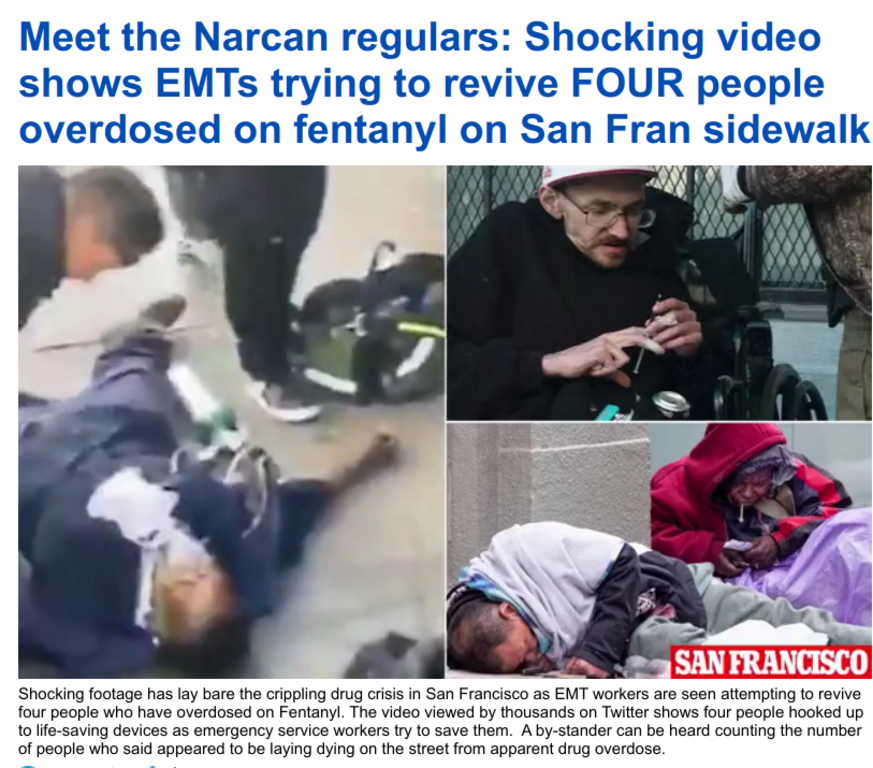Can We Be Honest About Homelessness In San Francisco?
- San Francisco City Hall promotes itself to drug addicts and crazy people: “Come here and be insane, we won’t bug you…”
- 1/2 of San Francisco City Hall bosses are drug users and alcoholics
- The refusal of the White House to shut the border down or limit drug traffic has ruined the City
- San Francisco has become one huge drug den supported by hippies that got elected
- Celebrity Chef Tyler Florence Reveals Plan To Fight Crime In Democrat Run San Fransisco — ‘We Can’t Live Like This’
-
NOBODY cares about homeless druggies. EVERYONE actually cares about housing affordability
- Sacramento refuses to do anything for middle-class homeless and only loves the street druggies
- All free housing should require a monthly blood test for drugs and STD’s
- Bidenflation Has Caused A Drastic
Number Of Americans To Live In Poverty
by

Recovery Must Be Top Priority
The debate about America’s homeless crisis has gone off the rails.
Consider:
Mayor London Breed and California Governor Gavin Newsom publicly condemned a misguided federal injunction imposed on San Francisco. Political leaders rarely weigh in like that but most of their constituents likely agreed with them;
New York City Mayor Adams announced support for suspending the city’s longtime right to shelter law. His action was a response to the sudden arrival of thousands of migrants from other states;
Los Angeles Mayor Bass is doing everything in her power to address the city’s homelessness crisis. But she is criticized for not doing better or doing more;
Ideology drives homeless policy debates more than ever. Two specific beliefs stand out:
1.Many homeless advocates refuse to accept that the unhoused population has changed. Far more are either drug addicts and/or have severe mental health issues.
2.Many critics of spending on homelessness wrongly claim that there is sufficient money to solve the crisis. Nonsense. Cities like San Francisco, New York City and Los Angeles have neither the housing supply nor the available rent subsidies to end homelessness.
People’s positions are deep seated. But I hope this piece causes rethinking about both of the above issues.
1. The Unhoused Population Has Changed
The Tenderloin Housing Clinic, which I head, has housed homeless single adults in San Francisco since 1988. We are San Francisco’s largest provider of permanent supportive housing for that population. I personally interviewed the first 100 or more placements. Most either had worked in warehouses or trucking and lost their jobs or were retired with too low an income to afford rent.
Until Care Not Cash took effect in 2005 (Gavin Newsom’s ballot measure to provide housing rather than a full cash grant to single adults on welfare) our housing program was strictly voluntary. That meant we were not seeing those who preferred spending their public assistance check on drugs rather than rent. Most saw this group as a small subset of the unhoused population.
It’s a very different unhoused population today. And deadly fentanyl has changed the rules .
Most of those now moving into THC’s permanent supportive housing units are drug addicts. The city does not require them to seek or obtain any recovery services. Services are available but completely voluntary.
The city used to house people after they had stayed in shelters. Now many enter hotels after years on the street. Many are not ready for housing. They make this clear by vandalizing common areas and bathrooms and disrupting other tenants.
Stories about permanent supportive housing SRO’s blame nonprofit operators for vandalism, overdoses, and other building problems. They ignore that people come into the hotels incapable of effectively functioning in that environment. The media depicts every tenant, even those causing violence and vandalism, as a “victim” of an uncaring hotel operator. Contrary facts are lied about.
City Must Prioritize Recovery
So how should San Francisco and other cities respond to the new unhoused population?
By prioritizing recovery.
San Francisco taxpayers should not subsidize housing for drug addicts over those seeking recovery. Period. City funds should prioritize those eager to turn their lives around.
The city should make acceptance of services a condition of receiving subsidized rents in city funded buildings. If you don’t want services, fine, stay in a shelter. But you shouldn’t get housed ahead of those seeking recovery.
The city’s current permanent housing model is not sustainable. Our elected leaders need to prioritize recovery over the “freedom” to use drugs.
Candidates for office in San Francisco’s November 2024 should ask constituents who they think San Francisco’s homeless dollars should be prioritizing. I bet residents of every district prefer targeting those eager to turn their lives around via recovery.
2. Public Funding is Vastly Inadequate
Some recovery advocates believe their own falsehood: that the obstacle to ending homelessness is in an alleged “Homeless Industrial Complex” where nonprofits get rich without providing services. No major West Coast city has the resources to make up for the failure of the federal government to provide the affordable housing and recovery funding necessary to end homelessness.
Here’s the truth:
MUCH IF NOT MOST OF SAN FRANCISCO’S HOMELESS BUDGET GOES TO RENT SUBSIDIES FOR THE ALREADY HOUSED. IT DOES NOT GO TO THE CURRENTLY UNHOUSED.
Did you miss that? I’ll say it again:
MUCH IF NOT MOST OF SAN FRANCISCO’S HOMELESS BUDGET GOES TO RENT SUBSIDIES FOR THE ALREADY HOUSED. IT DOES NOT GO TO THE CURRENTLY UNHOUSED.
A city’s “homeless budget” is primarily an affordable housing budget. It’s not a case of dividing the “homeless budget” into the current number of unhoused. It’s a case of dividing the homeless budget into every unit that the city subsidizes for the unhoused over the past thirty plus years.
Opponents of funding additional affordable housing and recovery services operate in a fictional world. A world which ends homelessness by defunding nonprofits and shifting their contracts to city workers who get paid substantially more. A world in which people get off drugs without new public funding and then automatically afford housing.
Can San Francisco’s homeless dollars be spent more strategically? Absolutely. And I’m all for auditing nonprofit contractors and city departments to make sure taxpayers are getting what they deserve.
But shifting homeless dollars to recovery is essential. As is pushing for the federal money needed to end homelessness.
Let’s be honest about the crisis. We need homeless policies that succeed in today’s world.








